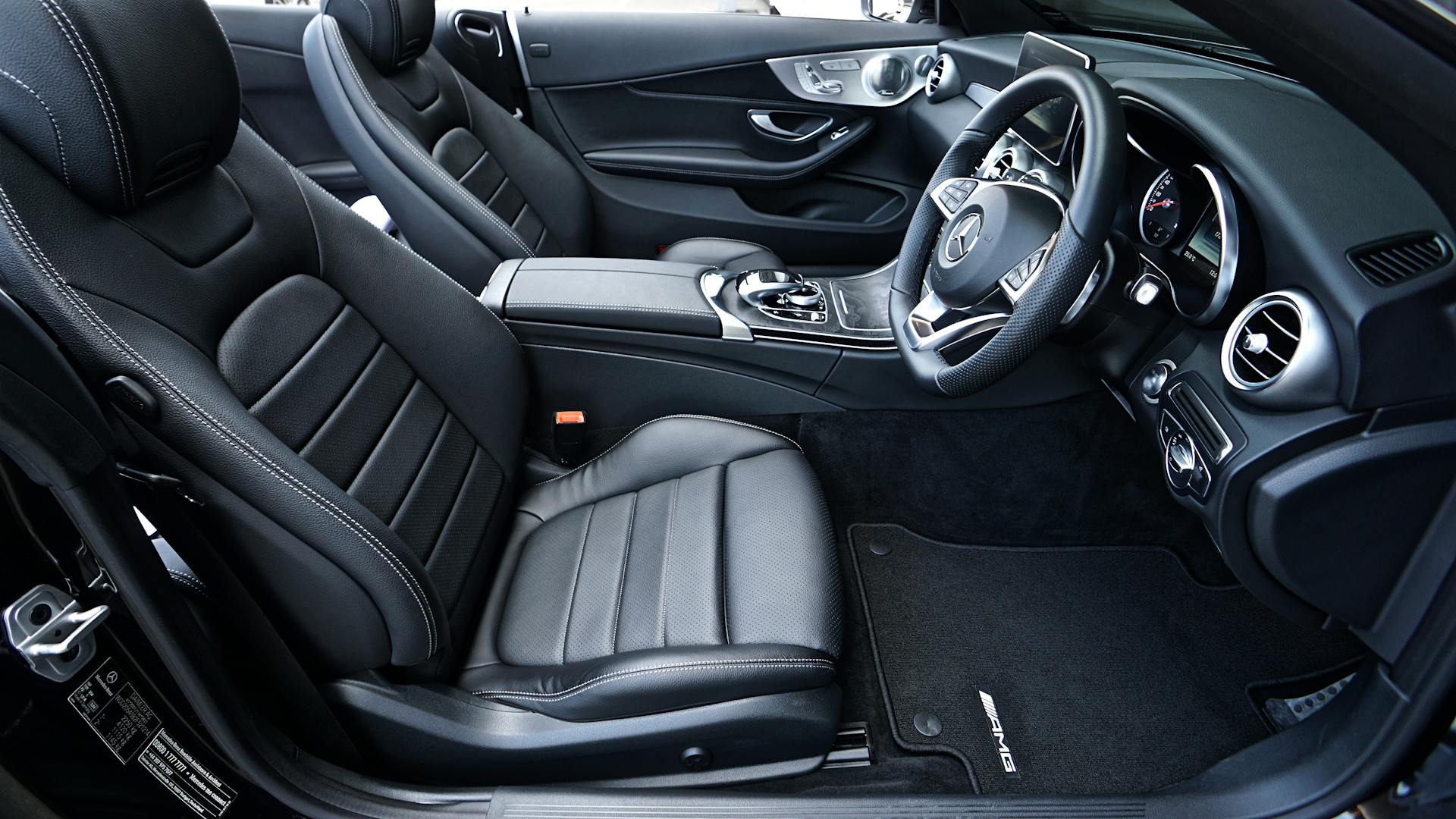
Before you start shopping for a leased vehicle, it's essential to ask the right questions to ensure you get the best deal.
What's the total amount of money I'll be paying over the lease term? This includes the monthly payments, fees, and any additional costs.
Don't be afraid to ask about fees, as they can add up quickly. Some common fees include acquisition fees, disposition fees, and excess mileage fees.
How many miles am I allowed to drive per year, and what are the penalties for going over that limit? This is crucial to know, especially if you plan on using the vehicle for long road trips.
Before Leasing
Get a copy of your credit report before visiting the dealership to get an idea of your creditworthiness. You can visit www.AnnualCreditReport.com or call 1-877-322-8228 to get a free copy.
Know your total cost, not just the monthly payment, to avoid being tempted by low monthly payment offers with higher interest rates and longer terms. This can substantially increase your overall cost.
Consider saving for a down payment first, as it reduces the amount you need to finance or lease, lowering your total financing or leasing costs.
Before You Buy
Before you head to the dealership, get a copy of your credit report from www.AnnualCreditReport.com or by calling 1-877-322-8228. This will give you an idea of your credit history and how it may affect your ability to get a loan.
You should also get an "out-the-door" price of the car in writing before visiting the lot. This will help you compare offers from different dealers and catch any extra charges or add-ons that may sneak into your deal.
A low monthly payment may seem appealing, but don't focus solely on it. Longer terms and higher interest rates can increase your overall cost, so make sure to calculate your total cost carefully.
Consider saving for a down payment first. This will reduce the amount you need to finance or lease, lowering your total costs.
If you don't have a strong credit history, you may need a co-signer on the finance contract or lease agreement. This can be a big responsibility, so make sure you understand the risks involved.
You might enjoy: Leasing a Vehicle with No Credit
Trade-in Consideration

Before you start looking at new cars, research the trade-in value of your old car. Check the National Automobile Dealers Association's (NADA) Guides, Edmunds, and Kelley Blue Book.
You want to get a fair trade-in value to negotiate a better price. This information may help you get a better price from the dealer.
Don't discuss the possibility of a trade-in until after you've negotiated the best possible price for your new car. You want to be sure the seller doesn't adjust the sales price of the car to make up for a generous trade-in offer.
If you still owe money on your car, trading it in might not help much. Know what you owe and ask how the negative equity will affect your new financing or lease agreement.
Here are some things to consider about negative equity:
Leasing Options
The annual mileage limit in most standard leases is 15,000 or less. If you exceed this limit, you'll probably be charged an additional fee when you return the car.
Consider all of the lease terms, including excess wear and damage, missing equipment, and insurance requirements. If you end the lease early, you may have to pay a substantial early termination charge.
To make the most of a lease, think about your driving habits and whether the standard mileage limit is sufficient for you. If not, be prepared for a higher monthly payment.
Renting vs Buying
Leasing a car can be a great option for those who want to drive a more expensive vehicle than they could afford to buy outright.
You can drive a luxury car on a budget, as leasing often lowers your monthly payments compared to purchasing a car.
However, be aware that most lease contracts have a mileage cap, and you'll face a penalty if you exceed the stipulated number of miles.
To get an auto lease, you typically need good credit, with a score of over 620 for most leases.
If you have a lower credit score, you may still be able to get a lease, but you'll likely pay a higher interest rate or make a larger down payment.
Recommended read: Does Leasing a Vehicle Help Your Credit
Options
Leasing a car can be a great option for some people, but it's essential to understand the terms and conditions before making a decision.
If you're considering leasing, think about how much you drive. The annual mileage limit in most standard leases is 15,000 or less, and exceeding this limit will likely result in an additional fee when you return the car.
Consider all of the lease terms, including excess wear and damage, missing equipment, and maintenance responsibilities. You'll also need to service the car according to the manufacturer's recommendations and maintain insurance that meets the leasing company's standards.
If you end the lease early, you may have to pay a substantial early termination charge. This is something to keep in mind if your plans change or you need to get out of the lease agreement.
Vehicle Benefits
Leasing a vehicle can be a fantastic option for many drivers, and one of the greatest benefits is that you don't need to worry about the vehicle losing value over time.
Managing your finances becomes more predictable with a fixed monthly rental, and you can even lease with insurance or add maintenance coverage.
You'll have access to a wide range of manufacturers and models, all while including road tax and a manufacturer warranty in the deal.
Leasing contracts can be tailored to your needs, with flexible mileage allowances that can be adjusted mid-contract.
The initial rental can be as low as one month, and you get to enjoy a brand-new vehicle every 2 to 5 years.
Leasing provides ongoing support throughout your lease term, ensuring a hassle-free experience from start to finish.
Lease Agreement
When reviewing a lease agreement, it's essential to understand the terms and conditions before signing. Be cautious of dealers who rush you through the process, especially if they're using an electronic system to show you the agreement.
Carefully review the terms, including all fees and charges, to ensure you're not agreeing to any extra items you don't want. Make sure to compare the terms at signing to what the dealer sent you beforehand.
See what others are reading: Contract and Vehicle Leasing
You should receive a signed copy of the completed credit contract or lease agreement before leaving the dealership. Ensure you understand whether the deal is final before you leave.
If the financing isn't final or doesn't go through, review any changes or new documents you're asked to sign carefully. Consider whether you want to proceed with the new deal.
If you're not satisfied with the new deal, tell the dealer you want to cancel and ask for your down payment and trade-in back. Get confirmation in writing that the application and contract were canceled.
Here are some key terms to understand in a lease agreement:
- MSRP (Manufacturer's Suggested Retail Price): the price set by the automaker
- Capitalized cost: the total cost of the vehicle you'll be making lease payments on
- Money factor or lease factor: the financing charge you'll pay on the lease, similar to an interest rate
- Residual value: the value of the vehicle at the end of the lease after depreciation
A lower capitalized cost will result in lower monthly payments, so be sure to negotiate this term. You can also use the money factor to calculate the equivalent annual percentage rate (APR) by multiplying it by 2,400.
Lease Terms
You'll want to ensure the manufacturer's warranty covers the entire lease term, so you don't end up paying for major repairs.
If you lease for the duration of the manufacturer's warranty, you'll avoid paying for major repairs. Ensure the manufacturer's warranty covers the entire lease term and the number of miles you're likely to drive.
The warranty coverage will depend on the manufacturer's policy and the terms of your lease.
Estimated Mileage

Lease contracts usually have an annual mileage limit, typically between 10,000 to 15,000 miles.
If you think you'll exceed that amount, buying a car might be a better option, as you can drive it as much or as little as you want without penalties.
Lease contracts include an annual mileage limit because a car's mileage affects its resale value.
Be sure to ask about the mileage cap and the cost-per-mile penalty for exceeding the limit when you sign your lease.
If you feel the mileage cap is too low, you can usually negotiate a higher limit, but doing so will increase the cost of the lease.
The excess mileage charge for miles driven beyond the specified limit typically falls between 3.0 and 25.0 pence per mile.
It's essential to be mindful of your allotted mileage and plan accordingly to avoid any unexpected charges.
Warranty Coverage
You'll want to make sure the manufacturer's warranty covers the entire lease term as well as the number of miles you are likely to drive.

Leasing for the duration of the manufacturer's warranty will save you from paying for major repairs. This can be a huge cost savings over the life of the lease.
The manufacturer's warranty should cover the entire lease term, not just a portion of it. This will give you peace of mind knowing you're protected from unexpected repair costs.
Leasing a vehicle for the length of the manufacturer's warranty can be a smart move, especially if you're not planning to drive a lot of miles.
Recommended read: Re Lease Car
7. Condition
Leasing a car can be a great option, but you need to be aware of the condition it's in when you return it. Normal wear and tear is expected after three years.
Worn tires and windshield wipers are common issues you might face. Anything beyond that could be assessed a fee.
If you want to avoid worrying about this, buying a car may be the better option.
Modifications

You can make modifications to your leased car, but it's essential to check with your funder first.
Most funders will allow modifications that don't leave permanent damage or marks to the vehicle when you return it.
Insurance and Maintenance
You'll want to understand what insurance and maintenance responsibilities come with leasing a vehicle. As the lessee, you'll be responsible for obtaining a fully comprehensive insurance policy for the leased vehicle, which can be a requirement to ensure you're covered in case of an accident or damage.
Some leasing agreements may include insurance as an option, but it's essential to check with the leasing company to see if you qualify. GEICO's Mechanical Breakdown Insurance is also worth considering, as it can cover all parts and systems of the car and potentially save you money in the long run.
You'll also be responsible for maintenance expenses, including oil changes, tire replacements, and other wear-and-tear costs. These expenses can add up over time, so it's crucial to factor them into your budget.
Responsibilities for Maintenance

When you lease a car, your entire lease term could be covered by the manufacturer's warranty and maintenance agreements, which usually last three or four years.
You'll need to pay maintenance-related expenses or do the work yourself after these agreements expire. This can be a significant cost, especially if you're not handy with tools.
The warranty and maintenance agreements often cover things that break, like brakes and engine oil, but not things that wear out, like tires. You'll need to budget for these expenses separately.
You're also responsible for taxes and licensing fees in your state, as well as car insurance. These costs can add up quickly.
Before you purchase an extended warranty, consider Mechanical Breakdown Insurance from GEICO, which covers all parts and systems of the car and could save you money in the long run.
Does Include Insurance?
Does include insurance? The answer is a bit complicated. Leasing a car usually requires a higher insurance premium because the leasing company technically owns the car in full and wants to make sure the car is well covered in case of an accident.
You'll be responsible for obtaining a fully comprehensive insurance policy for the leased vehicle. This is not included in the leasing agreement, so you'll need to shop around for a policy that meets your needs.
The good news is that some leasing companies offer insurance as part of their leasing agreements. If you're interested in this option, be sure to contact the leasing company to see if you qualify.
As the lessee, you'll be responsible for paying for car insurance, which can be more expensive than financing a car. This is because the leasing company wants to ensure the car is well covered in case of an accident.
You might enjoy: Questions to Ask Debt Consolidation Company
Wear and Tear Charges
Wear and tear charges can be a cause for concern, but it's essential to understand what's considered normal and what you might be responsible for.
Check with your dealer to make sure you understand the extent of wear and tear charges in your lease. You want to be sure to know what is considered normal wear and tear.
You might be surprised to learn that minor scratches, dents, or interior wear that can naturally happen over time are usually accounted for in your lease package. This means you won't be penalized for minor damage that occurs through normal use of the vehicle.
However, some damage, like stains on the upholstery, might still be your responsibility. Make sure to review your lease agreement carefully to understand what's expected of you.
Road tax is usually covered in your lease package, which can eliminate the need to manage these payments separately. This can be a big relief, especially for those who are new to leasing a car.
Take a look at this: Questions to Ask Insurance Adjuster Water Damage
Frequently Asked Questions
What is the 1 rule in car leasing?
The One-Percent Rule in car leasing calculates the lease offer's value by dividing the monthly payment by the vehicle's Manufacturer's Suggested Retail Price (MSRP). A result close to 1% indicates a good lease deal.
What is the biggest downside to leasing a car?
The biggest downside to leasing a car is that you don't own the vehicle at the end of the lease, leaving you without long-term control or equity in the vehicle. This can be a significant drawback for those who value ownership.
Sources
- https://consumer.ftc.gov/articles/financing-or-leasing-car
- https://living.geico.com/saving/money/car-leasing-vs-buying/
- https://www.lithia.com/research/car-leasing/questions-to-ask-before-you-lease-a-car.htm
- https://www.carleasing.co.uk/news/guides/questions-to-ask-before-leasing-a-car
- https://leaseguy.crestcapital.com/vehicle-financing/14-questions-anyone-leasing-a-car-should-ask/
Featured Images: pexels.com


